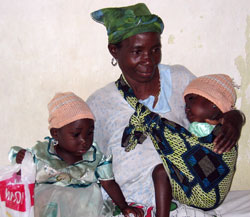Antimalarial Drugs Save Tanzanian Girl’s Life
RUJFIJI, Tanzania - October 2006
 |
||
| Zainabu Hamis Maubi, on the right, with her aunt who is also her caretaker, and her identical twin Zaituni. Source: Karie Atkinson/USAID | ||
Without lifesaving anti-malarial drugs, Zainabu Hamis Maubi would not be alive today. Through the President’s Malaria Initiative (PMI), the 2-year-old received artemisinin-based combination therapy (ACT) to cure her malaria.
ACT is made from the ancient Chinese medicinal plant, Artemisia annua, and has proven effective at fighting drug-resistant malaria.
Zainabu was sick with malaria for three days before her aunt and caretaker brought her to the local health center in Kibiti, a village in Tanzania’s Rufiji district three miles from the family’s home. Although the family lives closer to a private health clinic, the cost of getting treatment there was more than they could afford.
“I thought about going to the traditional healer but then thought the medicines that would be given to her would not suit the illness,” the aunt said.
“I am happy I brought Zainabu here for treatment,” she added. “If I had stayed at home I would have thought this illness was being caused by bad spirits but now I know it’s malaria.”
The aunt said the antimalarial drugs worked quickly, and that Zainabu started eating and playing again soon after taking them.
Zainabu, her head covered in a knitted peach and white striped bonnet, leaned her head on her aunt’s shoulder as her dark chocolate eyes became sleepy. They had returned to the clinic after a three-day treatment course of lifesaving anti-malarial drugs for a blood test to ensure the medicines had killed all the malaria parasites in her blood. The test came back negative. There were no more malaria parasites in her body.
As of November 2006, PMI had provided about 380,000 ACT treatments in Tanzania, more than 200,000 of them to children.